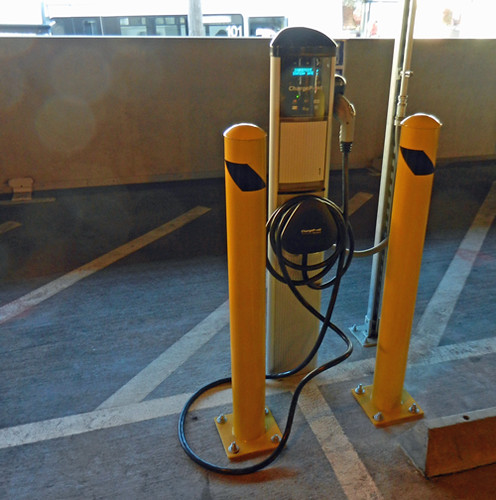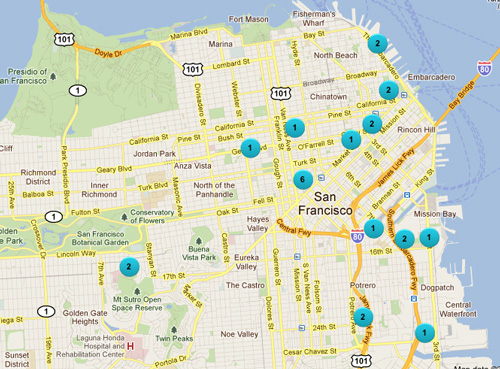
It's not a gas pump. It may soon become ubiquitous. You can find the nearest one here.

San Francisco has quite a few; I think their installation may have been assisted by Federal stimulus money.

When I noticed this one, a city owned car was hooked up to it.
People who know about this kind of thing maintain that electric cars really are less polluting and that wide adoption would push less carbon into the atmosphere. I have to wonder about that last, given our dependence on burning coal for electricity production, but I'll take it on faith. Here are Jay Tankersley and Ben Holland from the Rocky Mountain Institute:
So maybe it's not whether we have enough charging stations that will determine whether we move to electric cars.If widely adopted, electric vehicles could improve air quality, reduce dependence on oil, and spur domestic economic development. …
… traditional hybrid cars account for only about 2.0 percent of 2011 sales in the U.S. through October. For electric vehicles to have their full impact, the adoption of this technology must leapfrog that figure.
“History tells us it took hybrid sales over six years to reach a mass market tipping point,” says Mark Perry, director of product planning for Nissan Americas. “We see customer demand reach the same level for electric vehicles in half the time.”
The advantage of an electric vehicle over another alternatively fueled vehicle, such as a hydrogen fuel cell or natural gas vehicle, is that the infrastructure necessary to power them is largely available. Drivers can plug their cars into their home, or in a charging station at their apartment complex, and leave for work with a fully “fueled” vehicle every morning. And for most trips, publicly available charging stations will not be vital.
These authors name other obstacles:
I had to cringe when I read that. That's exactly how I feel: access to a roadtrip-suitable car is a fantasy of freedom for me. When I was young, I drove back and forth across the country, soaking in its wonders and pain. The idea that I might be confined to 40 miles between plugs feels like forced confinement. But what if that attitude is unsustainably anti-social? Or can industrial designers find compromises that satisfy both individual freedom and the unquestionable need for less polluting, less congesting transportation, especially in cities? Or does my "see the USA" generation simply need to die off?Although the vast majority of U.S. drivers travel less than 40 miles a day (a statistic mirrored by recent Nissan Leaf driver data), many car buyers want the option to drive across the country.
Despite every other legitimate concern, we cannot ignore that our economic and social system is rapidly making the planet less habitable. So I will be posting "Warming Wednesdays" -- unpleasant reminders of an inconvenient truth.
No comments:
Post a Comment